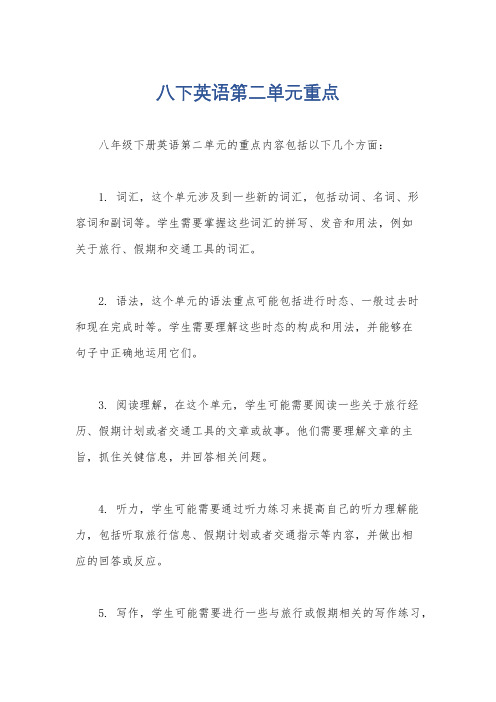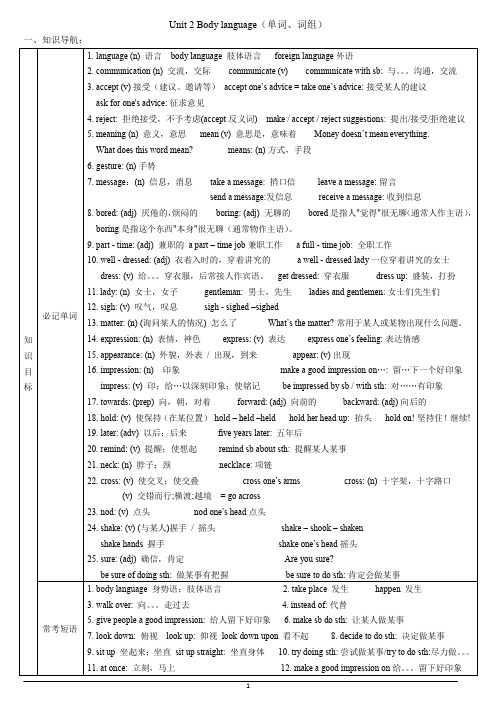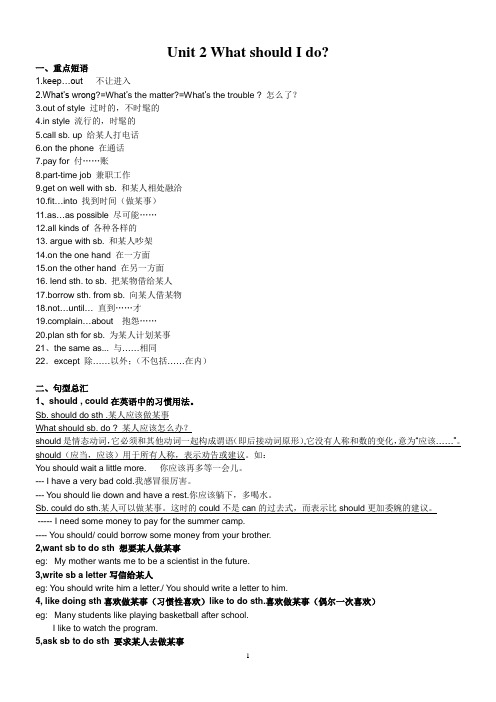深圳新版八年级下册unit 2知识点和语法点
八下英语第二单元重点

八下英语第二单元重点
八年级下册英语第二单元的重点内容包括以下几个方面:
1. 词汇,这个单元涉及到一些新的词汇,包括动词、名词、形
容词和副词等。
学生需要掌握这些词汇的拼写、发音和用法,例如
关于旅行、假期和交通工具的词汇。
2. 语法,这个单元的语法重点可能包括进行时态、一般过去时
和现在完成时等。
学生需要理解这些时态的构成和用法,并能够在
句子中正确地运用它们。
3. 阅读理解,在这个单元,学生可能需要阅读一些关于旅行经历、假期计划或者交通工具的文章或故事。
他们需要理解文章的主旨,抓住关键信息,并回答相关问题。
4. 听力,学生可能需要通过听力练习来提高自己的听力理解能力,包括听取旅行信息、假期计划或者交通指示等内容,并做出相
应的回答或反应。
5. 写作,学生可能需要进行一些与旅行或假期相关的写作练习,
比如写一篇关于自己假期计划的短文或者写一封给朋友的电子邮件,分享旅行经历。
总的来说,这个单元的重点是让学生掌握与旅行、假期和交通
工具相关的词汇、语法和表达能力,培养他们的阅读理解和听力理
解能力,同时提高他们的写作能力。
希望这些内容能够帮助你更好
地理解这个单元的重点。
深圳初二英语下册知识点总结

深圳初二英语下册知识点总结深圳初二英语下册知识点总结深圳初二英语下册涵盖了词汇、语法、阅读理解等多个语言技能的学习内容。
下面将对这些知识点进行总结,以帮助同学们更好地复习和巩固学习成果。
首先,词汇是英语学习的基础。
下册中出现了大量的常用词汇,包括名词、动词、形容词等。
同学们需要掌握这些词汇的中文意思以及正确的用法。
此外,还要注意复数形式、比较级和最高级形式等词汇的变化规则。
其次,语法也是初二英语下册的重点。
学习语法可以帮助我们正确地构造句子、使用词语,并提高语言表达的准确性和流利度。
下册主要涉及的语法知识点包括以下几个方面:1. 时态:掌握一般现在时、一般过去时、一般将来时等基本时态的用法和构造。
了解时态的转换规则,以便在具体语境中正确运用。
2. 从句:了解主从复合句的概念和构成关系,并掌握主要从句的用法,如定语从句、名词性从句和状语从句。
注意掌握从句的引导词和从句的语序。
3. 虚拟语气:学习虚拟语气的构造和用法。
了解虚拟条件句和虚拟结果句的关系,掌握虚拟语气的表示方法和常见的虚拟语气动词。
4. 情态动词:学习情态动词的用法和意义。
了解情态动词表示说话者的意愿、能力、推测、建议等不同情态,在使用时注意情态动词与其他动词的区别。
阅读理解是英语学习中提高阅读能力和理解能力的重要手段。
下册的阅读理解主要涉及到各种类型的文章,包括记叙文、说明文、议论文等。
同学们在进行阅读理解时,应该注意以下几个方面:1. 预测题:在阅读文章之前,通过观察标题、图表、段落结构等,可以尝试预测文章的主题和内容。
这有助于提前了解文章的大致内容,提高阅读效率。
2. 找关键词:在阅读过程中,要注意找出文章中的关键词和关键句,这些词汇和句子通常是文章的重点和要点所在。
3. 理解上下文:阅读理解中,有时会遇到生词和难句。
要尝试通过上下文的语境来猜测这些生词的意思,同时通过重新整理句子结构,理解难句的含义。
4. 注意细节:阅读理解中的问题通常会涉及文章的细节和综合理解。
2022年牛津深圳版八年级英语下册Unit2知识点语法精讲精练

新牛津深圳版八年级英语下册Unit2知识点语法精讲精练重点短语:1:part-time job 兼职工作2:travel agency 旅行社3:be at work在工作4:look up抬头看;查阅5:glance at扫一眼6:stare at盯着看7:walk over to走到…8:prefer…to宁愿…而不愿9:body language肢体语言10:get a chance to do sth. 得到机会做某事11:make a good impression on留下好的印象12:hold up抬头;耽误13:decide to do sth. 决定做某事14:smile at . 对某人微笑15:at once=right away 立刻,马上16:remind about/of sth提醒某人某事17. Think it over. 考虑18:agree with 同意某人的意见19:work as+职业:做什么职业20:one another互相(三者以上)21:during the summer holidays22:instead of代替,而不是23:look down往下看,蔑视24. be angery with .【注意区别】1)what does she look like?用来询问一个人的外貌长相是怎么样的,表达外貌时,描述特征时用主系表结构,人体部分描述的谓语用have/has连句子。
如---What does Jim look like?吉姆长得怎么样?----He is very thin and tall. He has short hair.拓展---what is Lucy like? 露西性格怎么样?(what’s …like? 人怎么样)----She's very friendly. 她很友好。
2)That lady told him how to send it in the fastest and cheapest way.tell to do sth告诉某人去做某事。
8B Unit2 Grammar 知识点练习八年级英语牛津深圳版(广州沈阳通用)下册

★思维导图★语法:动名词1 动名词的基本形式:动词原形+ing;否定式:not +动词原形+ing。
动名词是由“动词原形+ing”构成,它在句中可作多种成分。
变化规则1)一般在词尾加ing。
buy-buying wait-waiting rain-raining2)以不发音的e结尾的动词,去掉e再加ing。
use-using ride-riding3)以重读闭音节结尾,双写最后一个辅音字母再加ing。
begin-beginning cut-cutting4)少数以ie结尾的动词,变ie为y,再加ing。
die-dying lie-lying tie-tying5)以oe, ee, ye结尾的动词,直接在词尾加ing。
see-seeing flee-fleeing2 动名词在句中的作用:(1)作主语。
如:Seeing is believing. 眼见为实。
注意:动名词作主语时,谓语动词用单数形式。
(2)作表语。
如:Her Job is teaching English. 她的工作是教英语。
(3)作宾语。
如:I like travelling very much. 我很喜欢旅游。
(4)作定语。
如:This is our reading room. 这是我们的阅览室。
3 习惯接动名词作宾语的动词有:enjoy, finish, imagine, keep, mind, practise等。
如:My sister enjoys playing tennis. 我姐姐喜欢打网球。
Do you mind opening the window? 你介意开窗吗?4 动名词也可以在短语动词和介词后作宾语,习惯接动名词作宾语的短语有:be afraid of, be busy, be good at, be interested in, be worth, feel like, how / what about, look forward to, pay attention to, succeed in, think of等。
深圳新版八下英语Unit-2-Body-language-(单词、词组、reading部分知识点)

Unit 2 Body language(单词、词组)一、知识导航:二、要点全解:1. angry(生气的), excited(感到兴奋的), happy(高兴的), surprised(惊讶的) (1) angry (adj) 生气的angrily (adv)anger (n)be angry with sb: 生某人的气跟踪练习: “Why are you late for school again?” said his teacher . (angry)(2) excited (adj) 感到兴奋的,多指人对事物的感受,主语一般为人。
be excited about / at / by sth: 对。
感到兴奋e.g.: I am excited about the film. 我对这部电影感到兴奋。
【拓展】exciting (adj) 令人兴奋的,多指事物对人的影响,一般修饰物。
e.g.: Have you heard of the exciting news? 你听说那个令人兴奋的消息了吗? 【一言辩异】I was very excited after watching the exciting football match.观看了那场令人兴奋的足球比赛后,我感到非常兴奋。
(3) happy (adj) 高兴的 反义词: unhappyhappily (adv)happiness (n)(4)surprised (adj) 惊讶的多指人对某事感到惊讶,主语一般为人。
be surprised to do sth: 吃惊的做某事 be surprised at sth: 对某事感到惊讶be surprised + that 从句: 惊奇。
I am surprised to hear you say that.【拓展】① surprising: (adj) 令人惊讶的,表示某物令人惊讶。
It is a rather surprising achievement. 它真是个令人惊异的成就。
八年级下册第2单元知识总结

Unit 2 What should I do?一、重点短语1.keep…out不让进入2.What’s wrong?=What’s the matter?=What’s the trouble ? 怎么了?3.out of style 过时的,不时髦的4.in style 流行的,时髦的5.call sb. up 给某人打电话6.on the phone 在通话7.pay for 付……账8.part-time job 兼职工作9.get on well with sb. 和某人相处融洽10.fit…into 找到时间(做某事)11.as…as possible 尽可能……12.all kinds of 各种各样的13. argue with sb. 和某人吵架14.on the one hand 在一方面15.on the other hand 在另一方面16. lend sth. to sb. 把某物借给某人17.borrow sth. from sb. 向某人借某物18.not…until…直到……才plain…about 抱怨……20.plan sth for sb. 为某人计划某事21、the same as... 与……相同22.except 除……以外;(不包括……在内)二、句型总汇1、should , could在英语中的习惯用法。
Sb. should do sth .某人应该做某事What should sb. do ? 某人应该怎么办?should是情态动词,它必须和其他动词一起构成谓语(即后接动词原形),它没有人称和数的变化,意为“应该……”。
should(应当,应该)用于所有人称,表示劝告或建议。
如:You should wait a little more. 你应该再多等一会儿。
--- I have a very bad cold.我感冒很厉害。
--- You should lie down and have a rest.你应该躺下,多喝水。
八年级(下)英语Unit2知识点,重点短语及句型
Unit2 What should I do? 知识点: keep out 与keep off 都有“不许入内”的意思,keep out 是指“关在门外,不准入内”,而keep off 是指“避开,不接近”。
1. enough 此处为形容词“足够的,充足的,充分的”,修饰名词时通常放在名词的前面,但也可以放在名词的后面。
enough 修饰形容词或副词时,放在形容词或副词后,意为“足够的,十分地”。
2. find out ,look for 与find (1) find find out out 通常指通过调查,询问,打听,研究之后“搞清楚,弄明白”,大多指找出较难找到的较难找到的(2) look for 强调“寻找”这一动作。
强调“寻找”这一动作。
(3) find 意为“找到,发现”强调的是“找”的结果。
意为“找到,发现”强调的是“找”的结果。
3. besides (除…之外还,包括)与except =but (除(除…之外,不包括)之外,不包括)4.advice 是不可数名词,表示“一条建议”应用a piece of advice ,而不能说成an advice 5.姓的复数前加定冠词the ,表示“ΧΧ一家人”或“ΧΧ夫妇二人”。
重点短语:1. too loud 太大声太大声太大声2. out of style 过时的过时的 in style 流行的流行的3. find out 发现;查清楚;弄明白发现;查清楚;弄明白4. on the phone 用电话用电话5. spend…on +sth.=spend...( in) doing sth 在…花钱 It takes sb. sometime to do sth.某人做某事花某人做某事花…的时间6. lend…to 把…借给(借出去) borrow …from 从….借(借进来) You can keep the book for a week 你可以借这本书一周。
深圳市八年级下册unit 2词汇+知识点
词语释义5. When and where did that car accident take place?A. startB. happenC. leaveD. follow6. The old watch reminds me of my grandpa.A. makes me think ofB. makes me worried aboutC. makes me satisfied withD. makes me afraid of7. The twin brothers are alike in looks but have different hobbies.A. expressionB. spiritsC. feelingsD. appearance8. Y ou don't give people a good , so people chose Debbie insteadof you.A. impressionB. instructionC. impressiveD. instruct9. --- Would you please see the film Iron Man 3 with me tonight, Kate?--- I'd love to, but I've Linda's invitation to dinner.A. sufferedB. earnedC. receivedD. accepted ( ) 10. The house faces towards the river.A. inB. toC. atD. of ( ) 11. She is well-dressed when she goes out.A. in good clothesB. in simple clothesC. popularD. unpopular( ) 12. I held my arm in front of the doctor and let him check.A. enteredB. controlledC. comparedD. kept( ) 13. At first I didn't find Jack. Later, I found him in the library.A. SoonB. After sometimeC. SuddenlyD. Quickly( ) 14. That lady must be our English teacher.A. manB. teenagerC. professorD. madam( ) 15. Do you know what body language is?A. gesture languageB. written languageC. spoken languageD. foreign language( )1 6. Yesterday I _______an invitation from Tom but I didn't _______ it.A. received; receiveB. accepted; acceptC. accepted; receiveD. received; accept( )1 7. This film ________me of my late father. I miss him very much.A, promises B. reminds C. makes D. returns( ) 18. Can you tell me how to make a good ______on someone?A. communicationB. appearanceC. expressionD. impression ( ) 19. The word “______” means wearing attractive and fashionable clothes.A. kind-heartedB. hard-workingC. home-madeD.well-dressed( ) 20. --- How many_______ can you speak? --- Two English and French.A. messagesB. communicationsC. languagesD. words词性转换1.How do you____________(communication) with your friends?2.Tom doesn’t care about his __________(appear) at all.3.We will go to the beach on the __________(three) day.4.Arm enjoys __________(work) in the company.5.The children are happy and __________(cheer).6.Do you know the __________(mean) of this new word?7.I will come back __________(late). Please don’t leave.8.Please remember __________(close) the door when you are away.9.Which one do you __________(choice)?10.You must learn how to__________(expression) yourself.11.President xi made a wonderful _____________ ( speak) at the meeting. 12.Every day when I got back from school, my pet dog welcomed me ___________ (cheer), wagging its tail.13.With the development of science technology, _____________ (communicate) is much easier than before.14.My parents got an __________(invite) from one of my cousins to his wedding banquet(盛宴).15.Giving others a good ( impress ) is very important for us.16.I like the actor ( call ) Jack.17.Would you like ( sell ) the ticket to me?18.A: How do you study English? B: By ( ask ) teachers for help.19.I think the way we say something is ( important ) than the thing we say.20.My mother looks ( happy ) . Look! She is cooking( happy ).知识点1. --- Can you tell me how to make a good impression others?--- Smile often. That is the key success.A. on; toB. in; onC. at; forD. with; from2. T he 2022 Winter Olympic Games will in China.A. take downB. take offC. take placeD. take away3. --- I feel stressed from time to time. Could you give me some advice?--- sharing your worries with your parents?A. Why don't youB. How aboutC. Why notD. Would you like4. S he says she doesn't feel like out with you.A. goingB. to goC. for goingD. went5. I shall never forget the Alps for the first time. It was reallybeautiful.A. to seeB. seeingC. sawD. see6. T he book is worth , and I'm lookingforward it soon.A. to read; to readB. reading; to readC. reading; to readingD. to read; to reading7. --- I have difficulty new words. What should I do?--- You should understand the of new words before youremember them.A. remembering; meaningsB. remember; meaningsC. remembering; messagesD. remember; messages8.----Why not ______to the park now? ----Good idea. Let’s go. A.go B.to goC.goesD.going9.----Why didn’t they go on riding? ----Oh, when they came to a forest, they suddenly heard somebody_____for help.A.callsB.calledC.to callD.calling10.----Where is Jane? ----I don’t know. She left a(n)______.rmationB.messageC.newsD.advice11.----We know that he enjoys ______books very much.----So he does.A.readB.readsC.readingD.to read12.----Why are you keeping these old photos? ----Because theycan______me______the life living in the countryside.A.think; ofB.remind; ofC.look; afterD.turn; off13.----I haven’t had a chance______the movie. ----Sorry to hear that.A.seeB.to seeC.seeingD.saw14.----Did she______a good impression on his mother? ----Yes, she did.A.takeB.makeC.getD.have15.----Nick, would you mind______out of the bathroom? ----Sorry. I won’t be long.eB.to comeingD.came。
牛津深圳版八年级下册Unit 2 Body language 词汇和句型讲解
广州牛津版八年级下册Unit 2词汇与句型讲解1. Where does the story take place? 故事发生在何地?take place 发生。
一般指非偶然事件的发生,即这种事件的发生有其原因或事先的安排。
除“发生”外,还常翻译为“进行;举行;开展”等。
如:The meeting will take place later this afternoon. 会议将于今天下午晚些时候举行。
The Olympic Games of 2008 took place in Beijing. 2008年奥运会在北京举行。
辨析:happen发生。
常用于偶然或突发性事件。
如:What happened to you? 你出了什么事?The accident happened near the school. 事故发生在学校附近。
注意:take place和happen都不用于被动语态。
2. communication n.交流;交际communicate v.交流,沟通communicate with sb. 表示“与某人交流/沟通/联络”communicate to sb. 表示“向某人报告/通知/传达”如:Communication skills can be improved through practice. 交流技巧可以通过练习提高。
We communicate with each other by e-mails. 我们用电子邮件彼此交流。
She communicated the news to her mother. 她把这条消息告诉了她妈妈。
3. accept v. 接受(建议、邀请等)可接名词或代词作宾语。
He accepted a present from his friend. 他接受了朋友的礼物。
区别:accept表示主动而且高兴地接受, receive表示收到,但不一定接受。
八年级unit 2英语知识点
八年级unit 2英语知识点八年级英语是学习英语的重要阶段,其中unit 2是一个重要的单元,涵盖了许多英语知识点。
在这篇文章中,我们将一起来了解八年级unit 2英语知识点。
1.现在完成时在八年级unit 2中,我们需要学习现在完成时的用法。
现在完成时表示过去发生的某件事对现在产生的影响。
它的句式为“have/has+过去分词”。
例如,“I have finished my homework”表示我已经完成了我的作业。
2.虚拟语气虚拟语气也是八年级unit 2英语知识点之一。
虚拟语气用于表达假设、愿望、建议和命令等。
当我们用虚拟语气表达假设时,我们使用“if+主语+过去式”,例如,“If I had time, I would go to the movie tonight.”表示如果我有时间,我会去看电影。
3.情态动词在八年级unit 2中,我们还需要学习情态动词的用法。
情态动词包括“can、could、may、might、must、shall、should、will、would、ought to”,它们用于表达不同的意义。
例如,“can”表示能够,而“must”表示必须。
4.被动语态被动语态也是八年级unit 2英语知识点之一。
被动语态用于表示动作的承受者,并将动作的执行者放到句子的后面。
它的句式为“被动语态助动词+过去分词”,例如,“The cake was made by my mom”表示这个蛋糕是我妈妈做的。
5.定语从句在八年级unit 2中,我们还需要学习定语从句的用法。
定语从句用于修饰一个名词或代词,可以使用关系代词who、whom、whose、that和which。
例如,“The girl who is wearing a red dress is my sister”表示穿红色衣服的女孩是我的妹妹。
6.时间状语从句时间状语从句是八年级unit 2英语知识点之一。
时间状语从句用于描述一个动作发生的时间。
- 1、下载文档前请自行甄别文档内容的完整性,平台不提供额外的编辑、内容补充、找答案等附加服务。
- 2、"仅部分预览"的文档,不可在线预览部分如存在完整性等问题,可反馈申请退款(可完整预览的文档不适用该条件!)。
- 3、如文档侵犯您的权益,请联系客服反馈,我们会尽快为您处理(人工客服工作时间:9:00-18:30)。
深圳新版八年级下册unit 2 Body language知识点和语法点
1.必记单词和词组
(1)communication n. ________________ V.
常用句型结构:communicate with sb. =
communicate sth. to sb.
(2)m eaning n. _________________ V. ______________ adj.
(3)remind V.
常用句型结构:remind sb. of / about sb./sth.
remind sb. + that 从句
remind sb. to do sth.
(4)s hake V. shook shaken
(5)e xpression n. _______________ V.
(6)appearance n. ________________ V. 反义词_______________
(7)i mpression n. ________________ V.
make a good impression on sb.
(8)h old V. held held
(9)w ell-dressed adj.
dress n. 裙子 /V. 给···穿衣服 get dressed 穿衣服 dress up 打扮
(10)look down “俯视”反义词:look up
2. 易混淆词的辨析
(1)t ake place和happen (两者都没有被动语态)
take place:指事先安排好地,有计划地发生,没有“偶然”的
happen :指事情的发生往往带有“偶然”或“未能预见”的意味
翻译:自1978年以来,中国发生了巨大的改变。
这起事故发生在什么时候?
(2)p erson 和people
person:人,可数名词,其复数形式是:persons
people:作“人”是单复数同形,他还可以作“民族”,有复数性 people
一个人只可以说a person a people 表示一个民族
(3)w hole 和all (主要是位置不同)
whole 位于冠词、形容词性物主代词、指示代词和所有格等修饰成分的后面
all 位于冠词、形容词性物主代词、指示代词和所有格等修饰成分之前
He spent a __________ day in museum.
My teacher gave me _________ the advice I needed.
(4)t ry to do 和 try doing
try to do : 尽力去做某事,不包含是否成功之意,但有努力的
try doing:(用某一方法)试着去做某事
(5)w ear,put on,in和dress
wear:穿着,表状态,可接衣服、鞋帽、眼镜、耳环等
put on:穿上,表动作,可接衣服、鞋帽等
in:穿着,表状态,后接衣服、颜色
dress:给(某人)穿,表动作,后面接的是人不是衣服(6)make 的用法
make sb. do sth. = sb. be made to do sth.
make sth. to do sth. 制作某物去做某事
翻译:他们生火取暖。
make it +形容词/名词 +to do sth.使做某事······
翻译:因特网使查找信息变得容易。
make sb./sth. + 形容词/名词使某人/某物······
Our teacher tries to make us interested in learning English.
Our teacher tries to make her class interesting.
3.语法:动名词
结构:be+动词的ing形式
动词-ing的构成
成分:主语、宾语
做宾语:一般放在动词或者介词的后面
常见动词:enjoy,image,practise,finish,mind。
